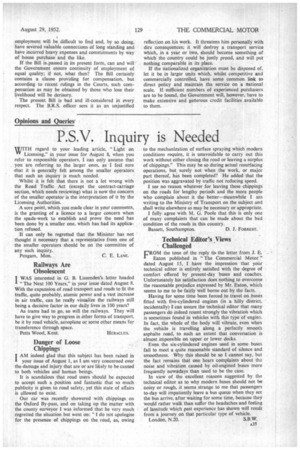P.S.V. Inquiry is Needed
Page 53

If you've noticed an error in this article please click here to report it so we can fix it.
WITH regard to your leading article, "Light on " Licensing," in, your issue for August 8, when you refer to responsible operators, I can only assume that you are referring to the larger ones, as I feet sure -that it is generally felt among the smaller operators that such an inquiry is much needed.
Whilst it is felt that there is not a tot wrong with the Road Traffic Act (except the contract-carriage section, which needs reviewing) what is now the concern of the smaller operator is the interpretation of it by the Licensing Authorities.
A sore point, which you made clear in your comments, is the granting of a licence to a larger concern when the spade-work to establish and prove the need has been done by a smaller one, which has had its application refused.
It can only be regretted that the Minister has not thought it necessary that a representative from one of the smaller operators should be on the committee of any such inquiry.
Pengam, Mon. C. E. LANE.
Railways Are Obsolescent
I WAS interested in G. LI Lissenden's letter headed "The Next 100 Years," in your issue dated August 8. With the expansion of road transport and roads to lit the traffic, quite probably, atomic power and a vast increase in air traffic, can he really visualize the railways still being a decisive factor in our daily lives in 100 years?
As trams had to go, so will the railways. They will have to give way to progress in other forms of transport, be it by road vehicle, aeroplane or some other means for transference through space.
Petts Wood, Kent. HERACLES:
Danger of Loose Chippings
I AM indeed glad that this subject has been raised in 1your issue of August 1, as I am very concerned over the damage and injury that are or are likely to be caused to both vehicles and human beings.
It is scandalous that road users should be expected to accept such a position and fantastic that so much publicity is given to road safety, yet this state of affairs is allowed to exist.
Our car was recently showered with chippings on the Oxford By-pass, and on taking up the matter with the county surveyor I was informed that he very much regretted the situation but went on: "1 do not apologise for the presence of chippings on the road, as, owing to the mechanization of surface spraying which modern conditions require, it is unavoidable to carry out this work without either closing the road or leaving a surplus of chippings." This may be so during actual resurfacing operations, but surely not when the work, or major part thereof, has been completed? He added that the position was aggravated by traffic not reducing speed.
see no reason whatever for leaving these chippings on the roads for lengthy periods and the more people who complain about it the better—meanwhile 1 am writing to the Ministry of Transport on the subject and shall write elsewhere as may be necessary or appropriate.
I fully agree with M. G. Poole that this is only one of many complaints that can be made about the bad condition of the roads in this country.
Bassett, Southampton. D. I. FORREST.
Technical Editor's _Views Challenged
FROM the tone of the reply t`o. the letter from J. E. Eaton published in "The Commercial Motor" dated August 15, .1 have the impression that your technical editor is entirely satisfied with the degree of comfort offered by present-day buses and coaches. Unfortunately his satisfaction does nothing to overcome the reasonable prejudice expressed by Mr. Eaton, which seems to me to be fairly well borne out by the facts.
Having for some time been forced to travel on buses fitted with five-cylindered engines (in a hilly district, incidentally) I can assure the technical editor that many passengers do indeed resent strongly the vibration which is sometimes found in vehicles with this type of engine. In fact, the whole of the body will vibrate, even when the vehicle is travelling along a perfectly smooth asphalte road, to such an extent that conversation is almost impossible on upper or lower decks.
Even the six-cylindered engines used in some buses fail to meet a quite reasonable standard of silence and smoothness. Why this should be so I cannot say, but the fact remains that one hears complaints about the noise and vibration caused by oil-engined buses more frequently nowadays than used to be the case.
In view of the excellent reasons suggested by the technical editor as to why modern buses should not be noisy or rough, it seems strange to me that passengers to-day will impatiently leave a bus queue when they see the bus arrive, after waiting for some time, because they would rather walk than suffer the headaches and feeling of lassitude which past experience has shown will result from a journey on that particular type of vehicle.
London, N.20. . S.B.W.




















































































